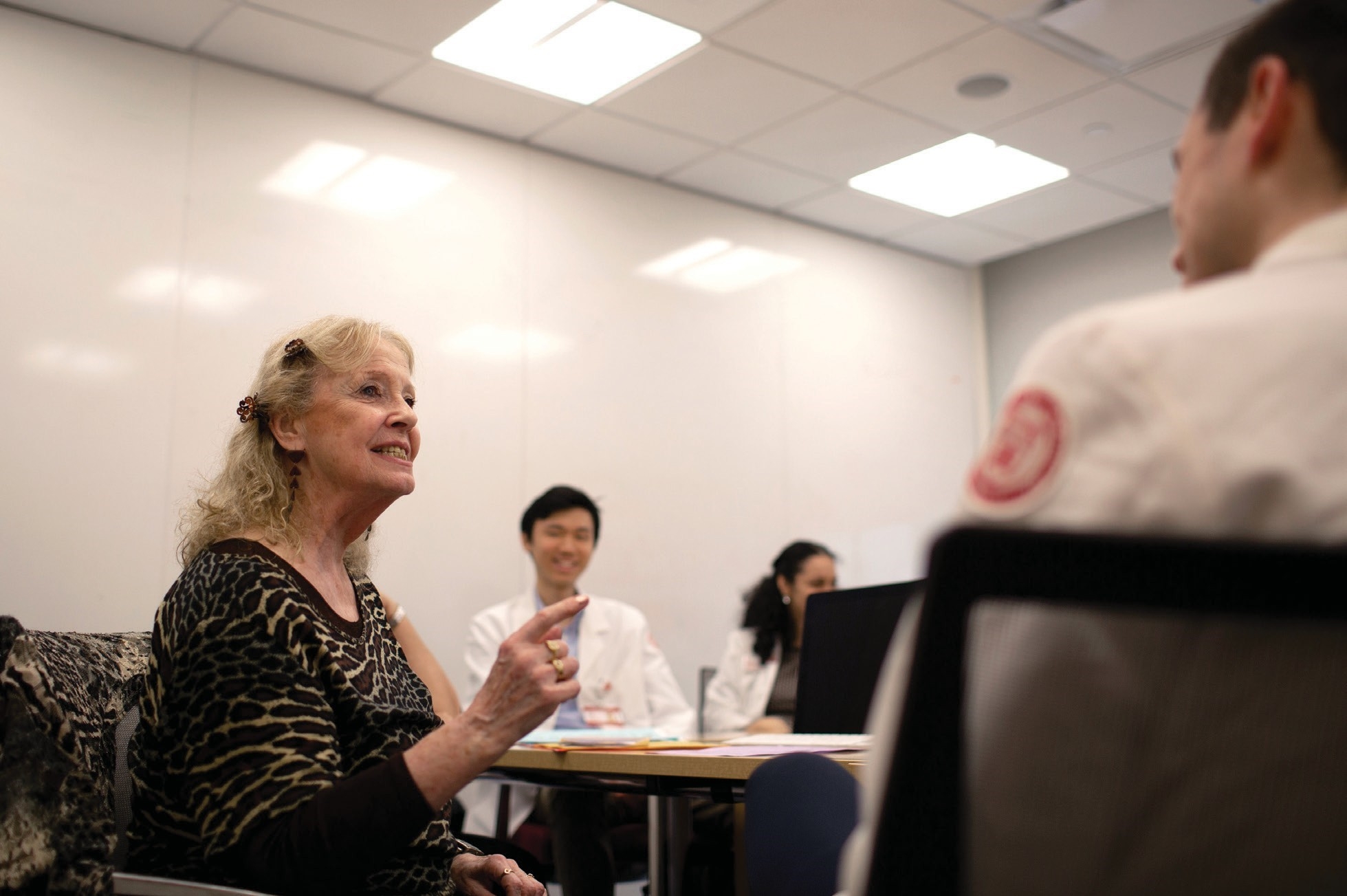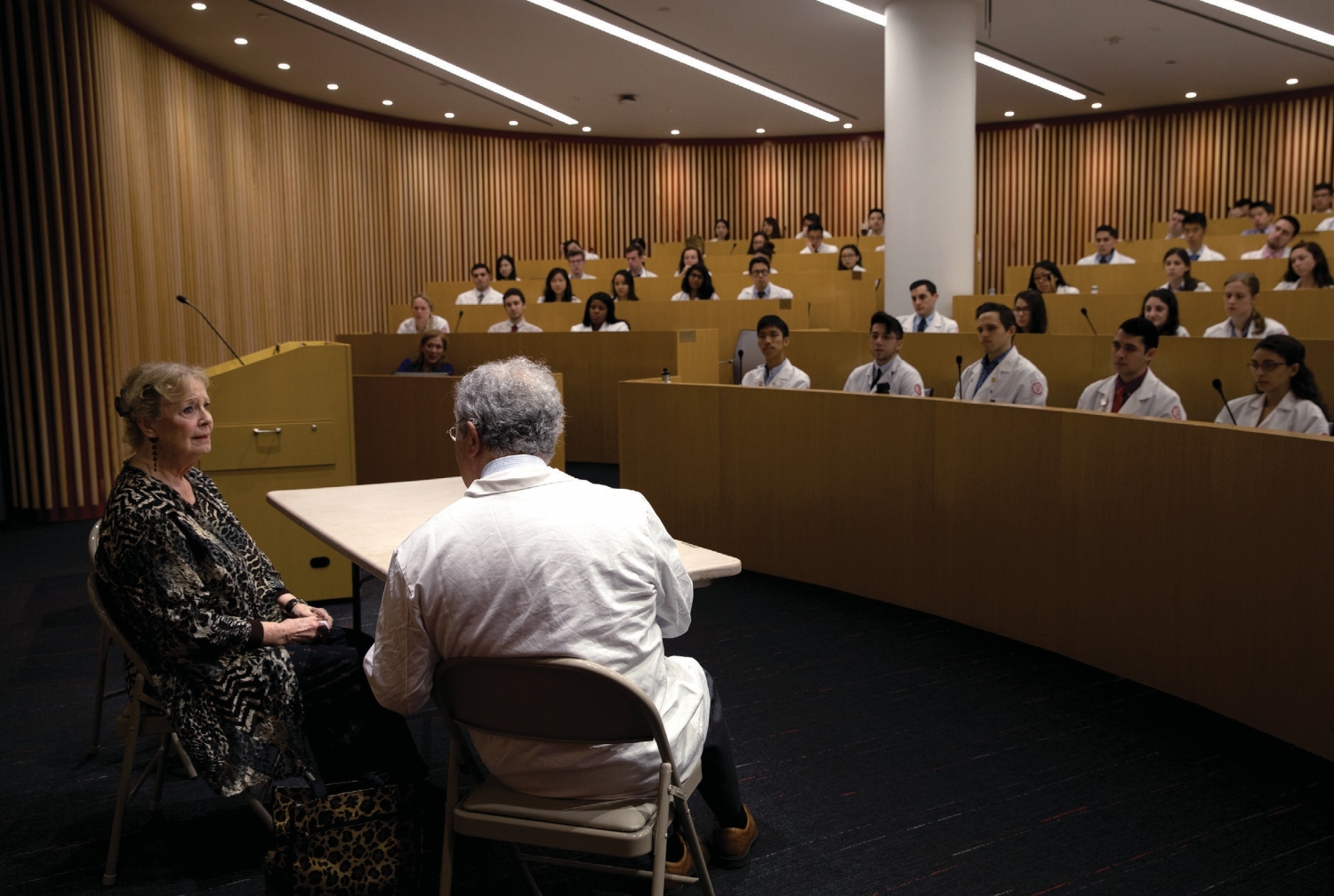One morning last fall, a group of second-year medical students watched an uncomfortable situation unfold. Having recently experienced some chest pain, a woman in her 80s had come to see a geriatrician, accompanied by her daughter. In a misguided attempt to help, the daughter kept interrupting and talking over her mother, who was becoming visibly anxious. After an initial assessment, the doctor asked to speak to the patient alone—and only then did he discover a likely cause of her chest pain. Having recently lost her husband, the woman had been feeling lonely, drinking more and experiencing symptoms of major depression. “That wasn’t something that was possible to uncover in the presence of her daughter,” says Dr. Ronald Adelman, the Emilie Roy Corey Professor of Geriatrics and Gerontology, director of the Irving Sherwood Wright Center on Aging at Weill Cornell Medicine, and an attending geriatrician at NewYork-Presbyterian.
Though the mother and daughter were portrayed by professional actors (with Dr. Adelman as the physician), the scene—played out in a Weill Cornell Medicine lecture hall—illustrates a type of encounter that’s distressingly common for older patients. According to Dr. Adelman, many destructive stereotypes about older people that are prevalent in society—including that they are depressing, unproductive and forgetful—are mirrored in the healthcare system. “Unfortunately, medical students only see the sickest people, when they’re in their worst shape,” says Dr. Veronica LoFaso, associate professor of clinical medicine and an attending geriatrician at NewYork-Presbyterian, “so it’s easy to perpetuate this way of thinking.” Ageism in the medical world can take many forms, she explains, such as a physician assuming that it’s natural for one’s quality of life to decline, addressing the caregiver instead of the patient, and patronizing older adults with pet names like “sweetie.” “We felt strongly that students should be able to see healthy, vibrant, functional geriatric patients,” says Dr. LoFaso, “because that’s what we see in our practice.”

Shepherd, no longer in character, chats with students about her own experiences as an older adult. Credit: Bess Adler
To that end, in the early aughts Drs. Adelman and LoFaso teamed up with Dr. Carol Capello, associate professor of geriatric education in medicine, to create a single-session seminar course called Introduction to the Geriatric Patient. Initially made possible by a $2 million grant from the Donald W. Reynolds Foundation, the course is held each fall and is mandatory for second-year students. It opens with a skit or two highlighting common challenges for geriatric patients and practitioners during medical encounters; then students are invited to question the actors, who answer both in and out of character. “It was very engaging,” says Maria Minor ’21, who attended in 2018. “It was really helpful to see that someone’s mind doesn’t necessarily go downhill when they get older. There’s an increased risk for things like dementia, but that doesn’t mean it’s the norm.” Students then break up into smaller groups and, along with a geriatrician or nurse practitioner, meet with a “real life” older adult. The visitors, all patients at the Wright Center, are leading vibrant and full lives—whether they’re traveling internationally, participating in the arts, or doing volunteer work. The students receive a checklist of questions to start them off, covering such topics as who manages the patient’s finances, how they do their grocery shopping, and whether they’ve discussed their wishes for end-of-life care with their family. “It was eye opening to see the kinds of things that might be important to a physician about a geriatric patient,” recalls Anu Goel ’21, whose volunteer patient described navigating New York City as an older person, among other experiences. “It helps reframe how you think about older adults in a clinical setting.”
Eighty-eight-year-old Marcia Levine has been participating in the seminar for more than a decade; she notes with a chuckle that one topic tends to make the future physicians particularly uncomfortable. “The students always ask questions about sexuality, and I want them to know that you’re sexual your whole life,” she says. “There are a lot of jaws hanging open at that.” The course’s creators hope that by the end of each annual session, they’ve given the students some key tools to combat ageism in medical encounters. Those lessons include understanding how prevalent this bias is, both in society in general and in the medical world in particular, and knowing how to ascertain a patient’s level of independence in such areas as mobility and self-care. Perhaps most importantly, they want students to appreciate the importance of taking a comprehensive history—which, as in last fall’s scenario, often means asking a caregiver to leave the room. “If they’re going to be my doctor, I want them to know who I am and what’s important to me,” Levine stresses. “That way, if something happens to me, they know I’m not just that illness.”
While Drs. Adelman and LoFaso admit that they hope to inspire students to pursue geriatrics, they note that regardless of what specialty the future doctors choose, they’ll almost certainly interact with older patients. “The idea is to educate a cadre of physicians who understand the issues of aging, who have the knowledge of the pharmacology and the chronic issues that go with aging, and who are sensitive and respectful of older adults,” says Dr. LoFaso. “Once you really get to know the individual, ageism goes out the window.”
- Alexandra Bond
This story first appeared in Weill Cornell Medicine, Winter 2019

